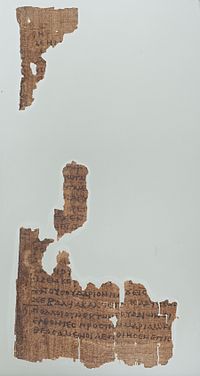John 11
| John 11 | |
|---|---|

John 11:45 in Papyrus 6, written about AD 350.
|
|
| Book | Gospel of John |
| Bible part | New Testament |
| Order in the Bible part | 4 |
| Category | Gospel |
John 11 is the eleventh chapter of the Gospel of John in the New Testament of the Christian Bible. It records the raising of Lazarus from the dead, a miracle of Jesus Christ and subsequent development of the plot against Jesus. The book containing this chapter is anonymous, but early Christian tradition uniformly affirmed that John composed this Gospel.
Events recorded in this chapter refer to the following locations:
The New King James Version organises this chapter as follows:
Chapter 10 ended with Jesus leaving Jerusalem as the Jews threatened to stone him, and travelling to the east of the river Jordan. The evangelist's introduction of Lazarus of Bethany at this point (John 11:1) leads to the discussion of whether Jesus should return to Judea (Jerusalem) in the face of the growing plot against Him. Mary and her sister Martha appear to have been better known than their brother Lazarus, as he is introduced by reference to them. Theologian Joseph Benson therefore suggests that "It is probable [that] Lazarus was younger than his sisters". The sisters send messengers to Jesus, so his location cannot have been entirely secret, "firmly expect[ing] that he, who had cured so many strangers, would willingly come and give health to one whom he so tenderly loved". The words of their message made reference only to Lazarus' sickness, leaving unexpressed "(but ... to be inferred) the consequent, therefore come to our help"Bengel notes that John often expects the reader to make such inferences, such as in : "When they wanted wine, the mother of Jesus saith unto Him, 'They have no wine' [leaving the consequent unexpressed, but implied, Do Thou relieve them]". Commentators generally understand that the sisters expected Jesus would come to Bethany despite the personal danger to Himself, with which His disciples were more concerned (John 11:8), although Exclusive Brethren theologian John Nelson Darby notes that "He might have said the word, as in the case of the centurion, and of the sick child at the beginning of this Gospel (John 4:46-53)".
...
Wikipedia
